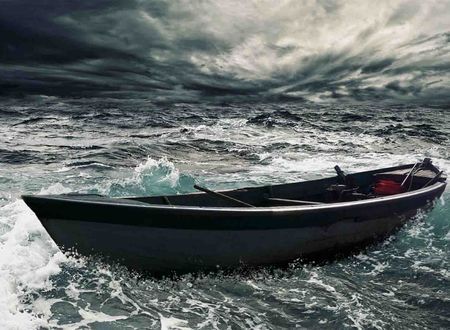Have you noticed that we are forever searching for a place in our hearts, in others’ hearts and lives, a place that gives us happiness? We want to matter, we want to belong to someone or something. We have come to believe that being wanted or being popular is somehow an indication of how important or loved we are. In other words, the more indispensable I am to someone (or even some organization), the more I’m wanted and the more I’m wanted the more I feel loved. We go from one place to the next, this ashram to that, one person to another, in search of that one place where we are wanted not for what we provide but for what we are.
They call it Utopia, Siddhashrama, Gyanaganj and what not: the best place. Perfect harmony. No ailments, afflictions or discord. Only joy, peace, bliss. To fulfill our desires, throughout human history, we have embarked on long and arduous journeys. Vasco da Gama discovered the sea route to India, although Columbus, perhaps, thought otherwise (But, really, a heartfelt thanks, Columbus, for without your accidental discovery, we would be without an iMac, Amazon and Google today. Not to mention the gigantic food portions, and to-die-for menus at Domino’s, McDonald’s, Burger King etc. that hasten our journey to the other world. The bucket at KFC can help anyone kick the bucket sooner. Quite fast, this fast food, I tell you.)
Humor aside, where should we be really? What’s the best place?
Coleman Barks in The Big Red Book (my gratitude to the person who gave me a copy of this book) cites a beautiful story from Shams Tabriz’s Maqalat. Shams was the murshid, spiritual guide, of the legendary Sufi mystic, Rumi. Here’s the story in Coleman’s words:
A great caravan arrives at a place where there is no habitation and no water. There is a deep well, but no bucket or rope. To test for freshwater, the caravaners tie a kettle to a rope of their own and let it down. It strikes something, and they pull, but the kettle breaks away.
They send down another and lose it too. After that they lower a thirsty volunteer from the caravan, then another, and another, but they also disappear. A wise man says he will go down. He is nearly to the bottom, when a terrible dark creature appears.
“I can never escape from you,” says the man to the monster, “but I hope at least to stay aware, so I can see what is happening to me.”
“Don’t tell me long stories,” says the monster. “You are my prisoner. You will never leave unless you answer one question.”
“Ask it.”
“Where is the best place?”The wise man reflects to himself, “I am totally helpless here. If I say Baghdad or some other beautiful place, it may be that I will insult his hometown by not mentioning it.” He replies, “The best place for someone to live is where he feels at home. If that is a hole in the middle of the earth, then that is his home. That is the best place.”
“Well said. You are a rare human being,” says the monster. “Because of your blessing, I will set the others in your care free and give you authority over the earth. I will take no more prisoners, and I will release the waters of this well.”
Shams in his wild wisdom advises us to bless the monster in his home, where he lives. I like what you have done with the place.
The best place is indeed where we feel at home. In a home, you may argue, fight, disagree but you are still together at the end of the day. You may be judged by your parents or siblings, but still you don’t mind dining under the same roof. In other words, being at home means to have your own little personal space among a group of people you care about. A place where you don’t mind hearing that you are wrong. A place you go back to when you are down. Those people that live there, no matter how upset you might be, you don’t want any harm to befall them, they are the first ones who come to your mind whenever you need to share your grief and sorrow.
The yogis, however, called even our physical home temporary, for, when our mind is not at ease then even our home doesn’t feel like a home. It feels like any other building with a bunch of people we know but we don’t. Everything material is transient and will eventually perish. Therefore, to seek eternal peace in an ephemeral reality is mostly a futile attempt. Instead, we must seek our inspiration from the highest state of our consciousness, the eternal you that you carry in yourself, because that is longer lasting than anything else we may ever discover. Just imagine how joyous we feel when our mind is engaged in something creative, productive, something that challenges us to step out of the confines of what we may already know and forces us to think differently.
The more we are in harmony with nature, the greater our joy. When I say nature, I don’t necessarily mean trees, mountains and what have you. By nature, I mean the alignment of the internal with the external. My desires, expectations, dreams, and goals are all inside me, they exist in my mind first, in my inner world. My material wealth, the people around me, my possessions, exist in the outer world. The wider the gap between what I see inside and what I find outside, the more away from home I’ll be. Yes, ideally being at home, is to be surrounded by people who love you and want you, but that’s only half the truth, certainly incomplete. To be at home is to be free. And, freedom is an internal matter, an inner condition.
The world outside can cast off the chains, but it can’t undo the shackles of thoughts. It can shorten the distance but it can’t make the heart grow fonder. How fulfilled you feel in the world, in your job, in your relationships is one hundred percent dependent on on how content you are within.
Perhaps, no better way to end this post than to quote Rumi from the same book again:
Jars of springwater are not enough anymore.
Take us down to the river.
The face of peace, the sun itself.
No more the slippery cloudlike moon.
Give us one clear morning after another,
And the one whose work remains unfinished,
Who is our work as we diminish,
Idle, though occupied, empty and open.
Peace.
Swami
P.S. I’m pleased to announce the following camps in Singapore, Australia and New Zealand. (UK, USA and Canada will be announced next month.)
- Singapore Kundalini Camp. 27-28 Apr. 120 spots.
- Sydney Kundalini Camp. 4 – 5 May. 120 spots.
- Auckland Meditation Camp. 11 – 12 May. 90 spots.
A GOOD STORY
There were four members in a household. Everybody, Somebody, Anybody and Nobody. A bill was overdue. Everybody thought Somebody would do it. Anybody could have done it but Nobody did it.
Don't leave empty-handed, consider contributing.It's a good thing to do today.





Comments & Discussion
17 COMMENTS
Please login to read members' comments and participate in the discussion.